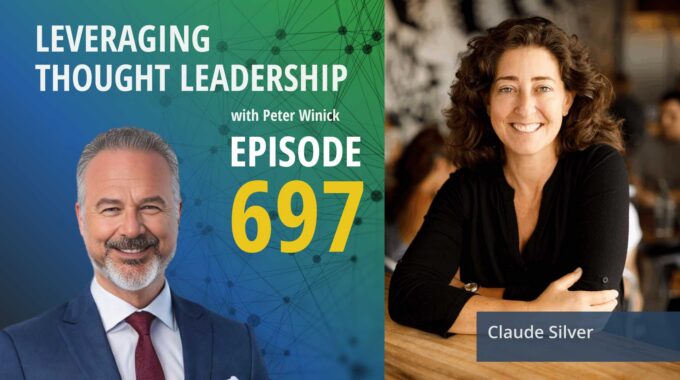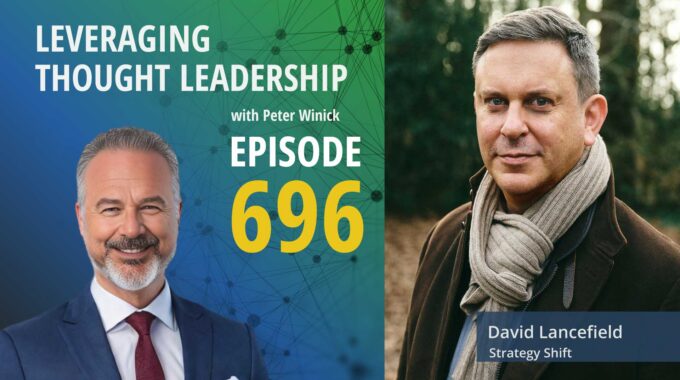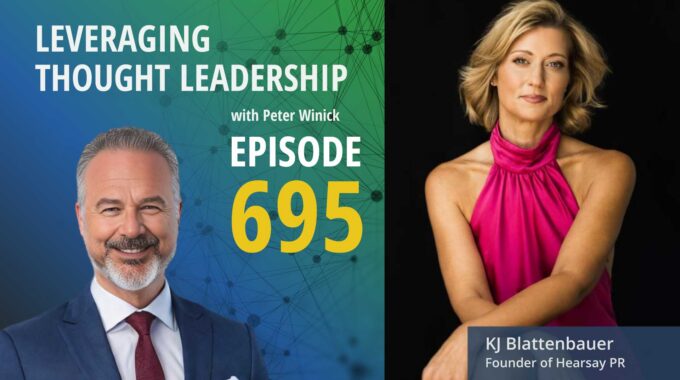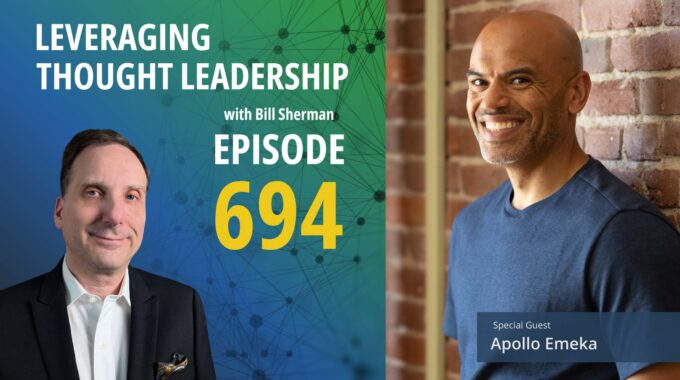Frameworks for connection, accountability, and performance This episode examines how psychological safety drives performance, how…
Finding the Truth in the Topic | Mark Miller
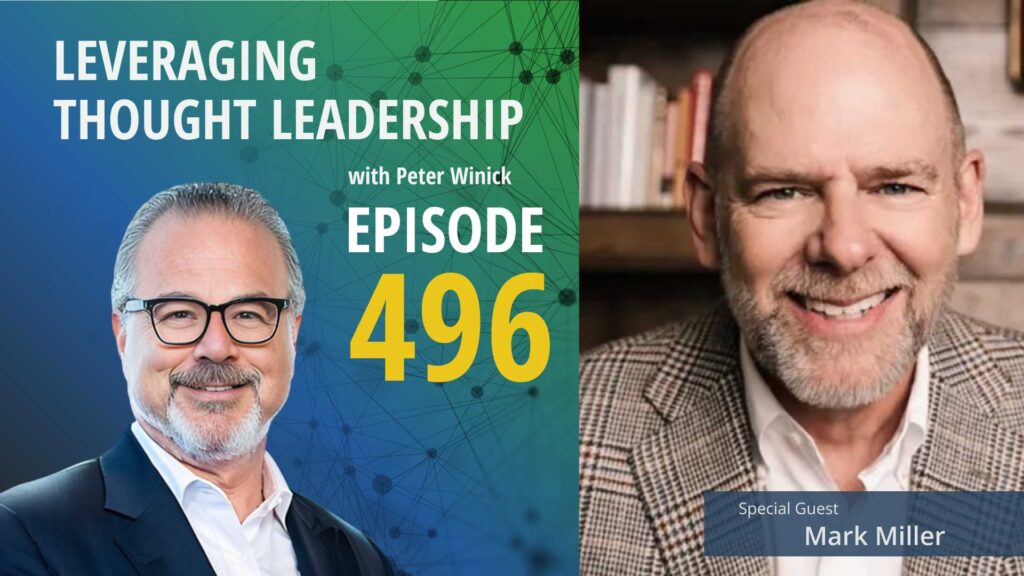
Creating thought leadership that has universal appeal on important topics.
An interview with Mark Miller about the process used to write and market his ideas.
When you start a new thought leadership project, what’s the first question you ask?
Do you look at who the project is for? What does it mean to your organization? What the ROI could be?
Today’s guest asks the question, “What is universally true about this topic?”
Our guest today is Mark Miller, Vice President of High Performance Leadership, Chick-fil-A Inc. and Wall Street Journal Bestselling Author of The Secret: What Great Leaders Know and Do and his newest book Culture Rules: The Leader’s Guide to Creating the Ultimate Competitive Advantage.
Mark takes us back to his first book and how it was born out of necessity: Chick-fil-A wanted stronger leadership, and took it upon themselves to do the research to find out what that takes. During the process, Ken Blanchard realized the work being done not only articulated what great leaders do at Chick-fil-A, but more, it touched on the things that distinguished great leaders throughout history. And thus, Mark created The Secret: What Great Leaders Know and Do.
With every project, Mark starts with the seemingly simple question, “What is universally true about this topic?” The question acts as a guideline to create a point of view on emerging business issues, and builds a foundation that can serve their organization and the world at large because the viewpoint created reaches beyond any one industry and to the heart of topics like leadership and culture.
Having authored and published books for twenty years, Mark has seen a lot of change. We discuss the strategies Mark is employing as an author, to keep landing on the Wall Street Journal Best Sellers list. We explore prelaunch campaigns, creating a personal army of enthusiastic ambassadors to share the news about your book, and more. Mark gives us the inside track of how he used incentives, gamification, and helping non-profits, to promote the book and find his audience.
Three Key Takeaways:
- With most projects, try to start with “What is universally true about the topic?”
- Everything rises and falls with leaders. If you can help them grow their capacity, impact, and influence, then everyone wins.
- Multi-faceted book launch campaigns that recruit champions, incentivize their participation, and generate Amazon reviews are just a few ways to have a successful book.
If you need a strategy to bring your thought leadership to market, Thought Leadership Leverage can assist you! Contact us for more information. In addition, we can help you implement marketing, research, and sales. Let us help you so you can devote yourself to what you do best.

Transcript
Peter Winick And welcome, welcome, welcome. This is Peter Winnick. I’m the founder and CEO at Thought Leadership Leverage and you are joining us on the podcast today, which is leveraging thought leadership today. My guest is Mark Miller. He is the vice president of High Performance Leadership at Chick-Fil-A and he has done some amazingly interesting thing over things, plural over the last 40 years, including his latest, which is a book that he just put out called Culture Rules The Leaders Guide to Creating the Ultimate Competitive Advantage. So welcome aboard, Mark.
Mark Miller Thank you, Peter. It’s great to be with you.
Peter Winick Thank you. So let me let me sort of dive right in. So you fit in in my universe of working with authors, thought leaders, academics, consultants, etc., you’re in this sort of really interesting category of sort of the embedded thought leader. Right? So you are you know, you’re at a big company about a very well-regarded company. You have functional responsibilities, not like you get paid to sit around all day thinking big thoughts like an academic, right? Yet you’ve built up this more than a brand, but a but an ethos, if you will, of thought leadership along the way. So give me a sense of how that came to be. Is it an extension of the day job? Is it in addition to just give me a sense of sort of how all that has happened for you?
Mark Miller Well, I think it really started about 25 years ago when we began trying to figure out how to help our leaders grow their capacity. It’s like this was a felt need for us. And the very first manifestation of it was we needed a stronger leadership bench. And so I was asked by our executive committee to figure that out. And I put together a team of really smart people. We went to work trying to figure that out. And ultimately Ken Blanchard found out about that work and challenged me that it needed to be a book to a new can. And I said, Ken, everything looks like a book to you, which is why I sold 50 million books. And he said, You don’t understand. He said you guys were trying to articulate what great leaders do at Chick-Fil-A. He said, What you’ve done is you’ve articulated what great leaders have done throughout history, and it has to be a book. So he persisted. We did a book. I tell people I’m the accidental author because he kind of twisted my arm to do that. And that was my first book was called The Secret, and it’s now in 25 languages. So it was like, okay, here we go. And then over time we realized that we could tackle emerging business issues, create a point of view, publish that which would serve our organization and the world at large. And so culture rolls, I think is my 11th project over 25 years where we try to look just toward the horizon and say, what are those emerging issues? And sometimes will be so bold is to look over the horizon and say, “Hey, we want a point of view on X, Y, or Z. We think that will serve our leaders and leaders at large.” And a few years ago we made that decision about the topic of culture. And of course, the pandemic I think made that look like a great choice in the rearview mirror, because the pressure that COVID put on organizational culture, it exposed both strengths and weaknesses, and I had never had so many leaders want to talk to me about culture. It kind of went to their top of their priority list. And so we’re thankful that we’ve got a point of view on that.
Peter Winick Yes. So what’s interesting about the point of view is that you’re not a consultant to an advisor, an academic thinking, theoretical, great thoughts on culture. I mean, there’s a lot of moving parts to your business, right?
Mark Miller So this is simply.
Peter Winick The Chick-Fil-A culture, but more importantly is sort of what can I learn from it, Right.
Mark Miller Well, no, actually, not with most all of the projects, probably 90% of the projects. We try to start with what is universally true about a topic. So in the case of culture rules, we ended up surveying or interviewing over 6000 people in ten countries, leaders and front line associates. And so we’re saying, let’s start with what’s true. I never want to be the guy that just publishes my personal bias. I want something that I can tell a leader all over the world. This will work. I want something I can tell the church, the school, the hospital, the military, the chicken restaurant. I want to try to write about what is universally true. And so our process for many, many years has been let’s try to start there as much as we possibly can.
Peter Winick So, in essence, you’re not. So simply put it this way, and I’ve seen several, whether it’s culture books, literature, books, whatever, that are the codification of the way we do it here. Wherever. Here. Right, Right the way What?
Mark Miller Yeah, yeah, yeah, yeah.
Peter Winick Right. And that’s. That’s a fine model. Hey, we’re known for our leadership. Excellent. Our management excellence. Whatever. Whatever. Let’s share it with the world. You’re almost a sort of an embedded research house in a fast food restaurant coming up with great things, like how does the business justify that? Right? Because at the end of the day, like, how does how does that all square? Because that’s a that’s interesting.
Mark Miller I think it squares because we believe everything rises and falls on leadership. Right. And if we can help our leaders grow their capacity, grow their impact, grow their influence, everybody wins. If we can help them better with execution, better with engagement, better with teams, better building a high performance culture, build better build up. And so those are some of the projects we’ve done over the years. And I would argue there’s a huge ROA on each and every one of them.
Peter Winick Well, that’s how it’s going to go. I would agree with all of those. But most companies, even those that are, you know, five, ten, 20 exercise talk a good game, but they’re not investing and really having that embedded thought leadership research and development arm inside because again you didn’t codify what we did here. You went out to the world and I mean, this is this is classic research classes, you know sort of an academic model. So how does the business measure the impact on the ROI that you’re having on it?
Mark Miller Well, let me let me back up. There is an academic component.
Peter Winick Yes.
Mark Miller But it is it is filtered extensively through a pragmatic lens and filter. I mean, you made the comment earlier, you know, I have functional responsibilities and have for over 40 years we’re running a business and then trying to help our operators run 3000 businesses. And so somebody told me recently, and I’m not sure if this is good or bad, I probably should repeat this, They said that my personal brand is you are painfully pragmatic. And I said, Well, thank you, I think. Right. If leaders can’t approach the truth, if leaders can’t apply the truth, if it doesn’t work, then everybody loses.
Peter Winick And so I think painfully pragmatic is the highest level of a compliment.
Mark Miller Well, I told him, I said.
Peter Winick I could say to you, Mark, you’re painfully academic. I don’t need the academic word. That just means you’re painful.
Mark Miller He said, Well, again, I’m thankful. And I kind of wear that proudly because, yes, the stuff has to work. Mm hmm. The staff has to work. And that’s on this project. I’ll give you just a bit of a tangent here. Culture is big and culture is complicated and culture is hard. You go to talk to 6000 people around the world in ten countries, and you’re going to have mountains of data. And then we did all of these interviews with probably 40 or 50 household brands from around the world. One on one interview, I mean, it was crazy and we were overwhelmed and we said, this is not going to help people. And we actually took inspiration from the SEALs, the Navy SEALs. And you might know this your listeners might know this a few years back. They wanted to document in writing their mantra, and the first thing they wrote down was shoot, move, communicate. And the CEOs would tell you that’s not all you need to be a single, but that’s what you need to live to fight another day. And we then said, okay, let’s take all this research and let’s look for the equivalent of shoot, move and communicate because it’s actionable. It’s it provides direction, it provides clarity. And it’s not all you need to know, but it’ll help you get through the day. And so that was actually what we tried to do. That’s back to that pragmatism. Is this approachable? Is this applicable? And that’s kind of been our charge and challenge. So again.
Peter Winick If you’re enjoying this episode of Thought leadership leverage, please make sure to subscribe. If you’d like to help spread the word about our podcast, please leave a five-star review at ratethispodcast.com/ltl and share it with your friends. We’re available on Apple Podcasts and on all major listening apps as well as that thoughtleadershipleverage.com/podcast.
Peter Winick So I want to go back though because everything that you say I love and makes sense, I would assume if you didn’t tell me where you had functional responsibility, I’d say, oh, you’re in an HR. Consulting firm or you’re in a big consulting shop, You’re a fast food restaurant. You’re in a franchise of a fast food restaurant serving 3000 plus restaurants. So how you know, at the end of the year or beginning of the year, whatever budget season is. How do we look at your. But, you know, the budget for all the stuff that you’re doing and say this is a good impact at r y on the business. Is it about talent attraction? Talent retention? Like what’s. Tell me what the levels are in the business.
Mark Miller All of it. It’s all of it. It’s all of it. It’s all of it. It’s sales, profits, customer satisfaction, engagement, retention. It’s like the budget. Here’s the truth. The budget for this work has not been questioned in 25 years.
Peter Winick See. And that’s fantastic because it would be easy to justify inside of an organization like yours. Like what’s a nice to have on what’s a must have. Right. And I’m sure somebody with the green visor is looking at that stuff all the time. If right now to save, you know, $0.02 a pound on a potato, you’re going to do it right?
Mark Miller That’s right. D Do you believe that everything rises and falls on leadership? And if you believe that and we think it’s our competitive advantage. We’ve got a great product, we’ve got great locations. We’ve got. But that local operator and his or her capacity, leadership capacity is our differentiator. It’s our competitive advantage. So every dollar we invest to help them grow and improve, there’s a huge around that huge.
Peter Winick That’s phenomenal. So I want to segue a little bit more to this is not your first rodeo, right?
Mark Miller That’s correct.
Peter Winick What has been different for you in the writing? But I would probably more so the marketing of this book than previous ventures you’ve been involved in previous books. How’s the market changed? How was it? The same.
Mark Miller Okay. I believe it’s harder than ever to sell books now that that could be my.
Peter Winick Only because that’s true.
Mark Miller That could be my imagination. I think back on the level of activity that we might have done ten years ago to promote a book and the return we got. And I say return the number of books we sold compared to recent years. And it’s just it’s just. Gotten harder. And so this year, my team did something that you might tell me I should have done decades ago. But we sat around and said, okay, what have we not done that we ought to try? Because if we do what we’ve always done, we’re going to get what we always got last year. And so we did what I guess would be classically defined as a pre-launch campaign. So why haven’t you done that before? But what we’ve done before, but never with this level of intensity. And the book made The Wall Street Journal last. It came in at number four. So I’m sitting here going, Huh, okay, well, we do that next time. I don’t know. But it worked.
Peter Winick And I think that that I did get an email last week from Matt Holt, your publisher, bragging about.
Mark Miller Okay, good.
Peter Winick I’m proud to see that with Jeremy. That looks great result. But let’s so I want to stay here a minute because this is important. Right. And lots you know, part of what happens is there are some sort of timeless things that are always true relative to book marketing. And then there are things that come into vogue and go away and things that come into vogue that stay because they were so this whole pre-launch community ethos, etc. it seems to me probably for the last 18 to 24 months is kind of a thing and it feels sticky right now. Five years from now, maybe somebody is listening this going, Peter, you idiot. But like right now it feels like it’s got legs. Can you could you describe for us what it is and how you developed it and deployed it? And obviously we got to that, we got to the punchline of we hit the list so well.
Mark Miller Again, it was a multifaceted campaign and I guess the best ones probably are. And we recruited about 450 launch team members. We called them culture champions. We sent them all two copies of the book part. If they wanted hard copy, they got it and they got one for themselves and one to give away.
Peter Winick So that giveaway piece is key. So I’m sorry to interrupt you there. We’ve seen versions of this where if you send me a book like I’m a guy that gets a lot of books sent to him, right? So, sure. Some I read and some I don’t because some are not things I would have opted in for. And if I want a book, I’ll pay the 2030 bucks for whatever. But some of them, what I get are things in advance or early on, but giving me two now, it’s really interesting. There’s a psychology to say, Jeez, well, I kind of like I it’s a shame to see a book just sit there idle. To me, that’s a crime, right? So now all of a sudden my brain’s going, Who’s whose hands can I give this to? That would appreciate it. Right? I’m actually putting some thought cycles into that. So I love that. Yeah.
Mark Miller The SAT and we had done that before years ago. And actually that might be as I think back, that was probably the book that I had the most Amazon reviews on, which again to me is kind of a tertiary metric. I know some people think that’s the metric is like, well, actually let’s look at how many books we sell. But nonetheless, I don’t want to minimize it. But when we sent out, you know, 500, well, we sent out a thousand free books, we got more Amazon reviews. And so we asked those folks to do that. We actually set up an incentive for them, gave them their own affiliate link, each one of them, and they got gift cards based on how many books they sold. We were they didn’t read.
Peter Winick For the money or were they doing it for the gamification.
Mark Miller For the writing? Well, you know, I don’t know. I think it was the gamification yourself. Buy books will give you a Starbucks gift card. You sell ten books or whatever it was. And again, not everybody took advantage of that. I haven’t even seen the final report, but some people sold some books because of that. So again, I think it was the spirit of it was gamification, not compensation. Right?
Peter Winick Yeah, No, that wasn’t the question. Yeah. Yeah.
Mark Miller So, so that was the spirit of it. So we did that. We had a couple of book incentives and one is my author friends tell me I’m crazy and you might as well. We told people that if they bought 11 books, I would do a zoom call with their team.
Peter Winick For 11 books.
Mark Miller Or 11 books.
Peter Winick How long is the call?
Mark Miller 60 minutes.
Peter Winick Wow. Okay.
Mark Miller Now my deal is, hey, if it works, it’s an opportunity to serve those teams. Yeah, yeah, yeah, I mean those people. So I’m okay with that? Well, I haven’t seen the final list. I hope it gets to 100. We may have 100 of those, so that’s cool. We also said if you buy 500 books, I’ll do a free keynote for you. Right. We probably got eight or ten of those. So this is what we did airport. We’re in 20 or 30 airports. So we this was a multi-faceted we did we didn’t add various platforms. We even hired an agency that did follow up calls to the champions to see if they’d gotten their books, if they had any questions, if they knew how the link works. So we pulled out all the stops we could think, and I probably missed some stuff.
Peter Winick Got it. So I love the experimentation piece because, you know, as I’m thinking about, you know, the 11 book piece, you know, mathematically, that’s a logical. Right. Just number of units all times dollars sold. But there is another there are other business models here, right? So if you get all these teams that you impact, talk about that because there is it’s not just about selling chicken sandwiches right inside.
Mark Miller Well, yeah, and you referenced the business model. It’s also an opportunity to add value to a lot of teams and organizations. Oh, we did something else, too. We did a grant for nonprofits. So we ended up we’ve got 50 nonprofits that are going to submit a grant. For how they can use the book to improve their culture. And we’re giving away some money in for book.
Peter Winick Is a reference got a tool. Excellent.
Mark Miller I’m stoked. We’re just. We’re just trying to stop.
Peter Winick One. I think that that that’s really the point is that, you know, if we were to revisit this conversation in a year, some of these things were great. Some of these things not so great, some things that you didn’t consider popped and well, whatever. You always have to have this mindset of experimentation when it comes to marketing. And I also love that you’re not just listening to the, quote, experts, because sometimes some of the quote experts, it’s kind of the same old, same old. And it’s like, you know, this is the way we do it here. And there’s this sort of open mindedness to your approach, I think is a lesson to.
Mark Miller Oh, by the way, I sent videos. Three or four videos to buy launch team specific. Maybe five where I sent them messages. How we’re doing? How you doing? Here’s where we are.
Peter Winick People are on the launch team total 450. I think that’s pretty strong because I’ve heard people or seen people know people trying to get that number to 100. And you basically have a team that gets a little bit of behind the scenes look and you’re sharing with them the success and they’re, you know, you’re building up a de facto sales team.
Mark Miller I also did three for webinar, three webinars for the public, and I did a webinar just for the culture champions. I think that I think yeah. Other than that, I can’t think of what else we did.
Peter Winick There’ll be more to come. Well, this has been fantastic. I appreciate sharing your journey and your experiences and your successes with us. Mark, I appreciate that a lot. Thank you so much.
Mark Miller Great to talk with you.
Peter Winick To learn more about thought leadership leverage, please visit our website at ThoughtLeadershipLeverage.com. To reach me directly, feel free to email me at Peter at thoughtleadershipleverage.com and please subscribe to leveraging thought leadership on iTunes or your favorite podcast app to get your weekly episode automatically.


